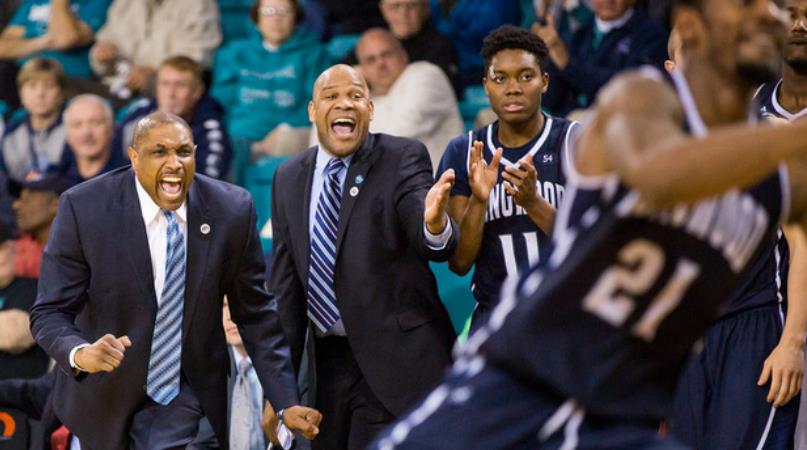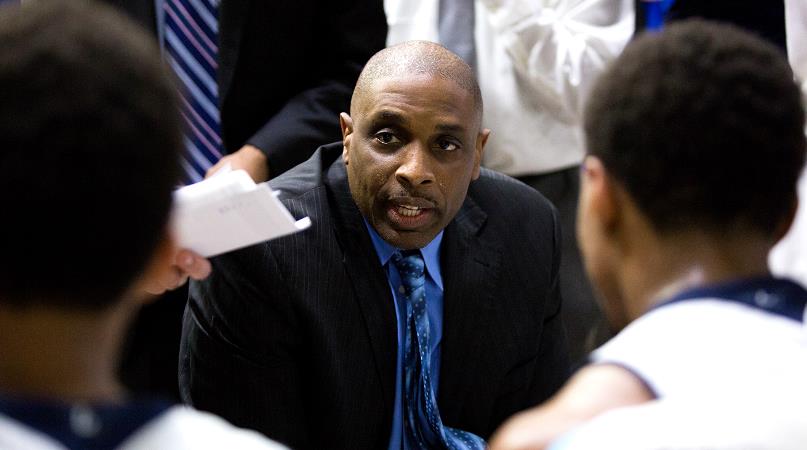This story appears in FCA Magazine’s March/April 2018 issue.
At the end of the 2002-03 basketball season, Jayson Gee made a decision that's difficult in any profession — walking away from a great job, a job you love, to pursue something more.
Gee had ushered in a new era at the University of Charleston, a Division II school in West Virginia. Over his seven years there, he led the Golden Eagles to sustained success, but he had a vision of becoming a Division I head coach. When he got a call in 2003 from Anthony Solomon, his longtime friend and the coach at St. Bonaventure, offering him an associate head coach position, Gee knew he had to accept.
He took his wife, Lynette, and two young boys, Brandon and Bryan, to Olean, New York, and the family began to settle into a new community. About 18 months later, though, Brandon (age 11 at the time), began exhibiting unusual and confusing behavior.
First, Brandon was convinced many of the kids at school were "talking about him." Later that week, he made an even more troubling accusation: The teachers were also talking about him.
Jayson and Lynette, not sure what to think, took their son's claims to heart. After all, Brandon had developed a reputation for always telling the truth. But after visiting with the school's principal and teachers, Jayson and Lynette believed them when they said no one was talking about Brandon.
Three weeks later, while Jayson and Lynette were in Texas for a tournament, Brandon and Bryan stayed with close friends in Charleston. Brandon's behavior became even more bizarre. He was suddenly reclusive, limiting conversations to a word or two. He would stare off into space. He stopped eating. Everything about him was different.
Then Jayson got a phone call.
"Dad, I went to church, and Pastor Watts and Sharon were talking about me," Brandon said. "And I'm in the newspaper. They're talking about how I'm Jayson Gee's son and how I'm embarrassing you. And your former players are outside the window. They're taunting me. They're threatening to kill me.
"I'm gonna die, Dad. I just know it. I'm gonna die."
Jayson felt helpless 1,300 miles away from his son. He did his best to console him, telling him, "Son, you're not going to die. I'll come get you."
Jayson and Lynette took Brandon to his pediatrician, then to a child psychologist, then through a whirlwind of hospital visits across western New York. Ultimately, the diagnosis was rare and painfully severe: Brandon was suffering from child-onset paranoid schizophrenia. His hallucinations were getting worse, and the voices in his head were taking over his mind.
The most startling change was his language. Brandon, the kid who once thought "shut up" was a bad phrase, now had fits of rage and profanity-laced tirades.
Initially, Jayson was in denial. He allowed Brandon to continue playing basketball, but soon his on-court behavior became an obvious hazard to other players. He also continued bringing Brandon to St. Bonaventure home games, but his presence was a distraction for those close to the program.
Finally, Jayson came to terms with reality. It drove him to his knees in prayer, where God revealed his son would be healed.
"My attitude went to a whole new level," he said. "From that second forward, I was in a spiritual trance. My son was going to be healed. I just needed to treat him as if he was going to be healed."
Jayson didn't know how or when. He just knew it would happen, and he held tight to that belief during the trying months and years ahead.
• • •
In the midst of the storm, Lynette received some bittersweet news: She was pregnant with the couple's third child, daughter Briana. The joyous moment was muted a bit by the uncertainty surrounding Brandon's mental health.
"We had prayed for another child," Lynette said. "I started to feel like I was being blessed with one while another one was being taken away."
At home, Lynette and Bryan were afraid to have Brandon in the house when Jayson was out of town. He was increasingly unpredictable. His auditory hallucinations brought on random fits of violence, and his medication made him constantly hungry, which led to more anger and frustration.
Eventually, Jayson and Lynette made the difficult decision to send Brandon to the Western New York Children's Psychiatric Center in West Seneca, a suburb of Buffalo three hours away from Olean. Unless he was on the road coaching or recruiting, Jayson made that drive. Sometimes Lynette would come. Other times a friend would accompany him. But usually he was alone.
During the drives, Jayson prayed a lot. He also had intense conversations with friends back in Charleston, including Keith Tyler, FCA's West Virginia director and a former college teammate.
"Jayson was the one who was holding us all together through this process," Tyler said. "He kept saying that Brandon was going to be healed. I was in agreement, but I also saw Brandon and his behavior. He was really out of it. I had to pray, 'Lord, help my unbelief.'"
After several visits, the doctors at the psychiatric center pulled Jayson aside. They were concerned he was putting himself and his other family members at risk by making the daily drive.
"I'm a competitor," Jayson said. "In some ways, that challenged me. It motivated me even more. Nothing was going to deflate me or deflect my attention away from what I believed. It made me even more determined."
There were numerous logistical challenges. As St. Bonaventure's associate head coach, Jayson would get up early and work from his office, then travel to see Brandon, and then return in time for practices and games. He felt bad about being gone so often, so he met with the other coaches to apologize. He even offered to step down if necessary.
But Solomon, the head coach, scoffed at that suggestion.
"I told him to take care of his family," Solomon said. "That was his first priority, and we were fully supportive of that. I can't say many could have handled it the way he did. That was only through the assistance of God. His faith was strong. He was a perfect example of a man of God. He upheld his responsibilities with excellence."
Through it all, the trips to West Seneca were rarely fruitful. Jayson read from the Bible, usually the story of Joseph. He prayed over his son. Brandon would sit emotionless for a few minutes and then leave without a word.
Against the doctor's wishes, Jayson began taking Brandon out of the hospital sometimes. They'd go shoot hoops at the University of Buffalo or go shop for shoes. The scariest moments came when Brandon would try to run away in a crowded parking lot. The most excruciating were when he'd become violent in the car, hitting and spitting on his father while repeatedly screaming, "I hate you!"
Heartbroken, all Jayson could do was calmly respond with an "I love you." Later, he saw the analogy between his actions and what Jesus spoke about in Luke 15:1-7.
"The shepherd put the entire flock at some level of risk to get that lost sheep," he said. "Brandon was lost. He was outside of the flock. I was called to go after Brandon, even if that meant leaving my job and my family to see him."

Jayson Gee (left) has been Longwood University's coach since 2013.
• • •
At the end of the 2005-06 season, Jayson accepted an offer to join head coach Gary Waters at Cleveland State. By then, Brandon had moved to a new day treatment facility in Olean. Even though he was still unstable, the Gees took another leap of faith and traveled from New York to Ohio.
In Cleveland, several miracles began to unfold.
Lynette took Brandon to a child psychologist, who introduced them to a study being conducted at the National Institute of Mental Health. A new treatment plan slowly improved Brandon's condition.
But then Jayson received a call from Brandon's treatment facility. Brandon had locked himself in a room, and the caretakers were going to physically remove him and put him in a straightjacket if he didn't come out on his own.
When Jayson arrived, he went into the room and was shocked. His son spoke clearly and sensibly for the first time in three years.
"Dad, do you know these people here are crazy?" Brandon said. "You've got to get me out of here!"
Jayson began shouting and rejoicing. He grabbed Brandon's arm and led him out of the room, past a host of confused onlookers.
"He's fine! He's fine!" he exclaimed. "We're outta here!"
There was still some recovery left, but Brandon was ready to return to his normal life. Over the course of several years, he and his siblings ended up at Cornerstone Christian Academy in Willoughby Hills, Ohio, where he and Bryan starred on the basketball team. Brandon learned to drive. He attended his senior prom. He overcame his pre-existing learning disabilities to graduate.
Eventually, Brandon coached youth basketball and later attended college. He completed ministry training in Kentucky, and he began volunteering as a junior counselor at a day treatment facility for adults with mental health issues in Farmville, Virginia. Brandon is also participating in a men's Bible study group at New Life Church.
"I don't think I'd be here today if it wasn't for my dad," Brandon said. "My parents and family members prayed me out of the hospital. My dad had the faith to come see me every day, after I spit on him and did all of that stuff. I don't know where I'd be without him."
• • •
In 2013, Jayson's professional diligence paid off. He was offered the head coaching job at Longwood University in Farmville, Virginia. Longwood had competed at the Division I level for just nine years, with only one winning season during that time. Jayson knew what he was getting into.
His journey with Brandon, however, has proved to be helpful.
"It was the training ground, not the complaining ground," Jayson said. "If Brandon can be victorious, then we can take the 349th program out of 350 and make it a winner. The odds were far greater for Brandon."
"Keep believing in God. Don't let the world tell you anything differently." — Jayson GeeWhen Jayson speaks in public he sometimes takes off his shoes, sets them down on the ground, and shares this message: "You think the person who wears these shoes is a college basketball coach. I'm not a college basketball coach; I'm a Christian coach. You think the person in these shoes runs a basketball program. I don't run a basketball program; I run a ministry. You think the person in these shoes has players. No, no, no. They're my sheep, and I'm their shepherd."
Bryan is one of Jayson's players. The mindset that gave Jayson the strength to visit Brandon daily now helps him deal with the challenges of coaching a fledgling Division I program.
In 2015, FCA recognized Jayson with the prestigious John Lotz Barnabas Award. The following year, a book titled The Battle For Brandon was published. A documentary of the same name (narrated by actress Jennifer Garner) is set to be released later this year and is being developed into a script for a feature film.
Jayson uses his story to minister to anyone who will listen. His message is simple, but powerful.
"Stay the course," Jayson said. "Keep believing in God. Don't let the world tell you anything differently. Trust in what God says to you, regardless of what the doctors say, regardless of what your friends say, regardless of what your family says. Trust God's voice over all."
-FCA-

Jayson Gee was supported by his former teammate Keith Tyler, FCA's West Virginia director, during Brandon's treatment.
Photos courtesy of Chad Bonham, Mike Kropf and Longwood University.